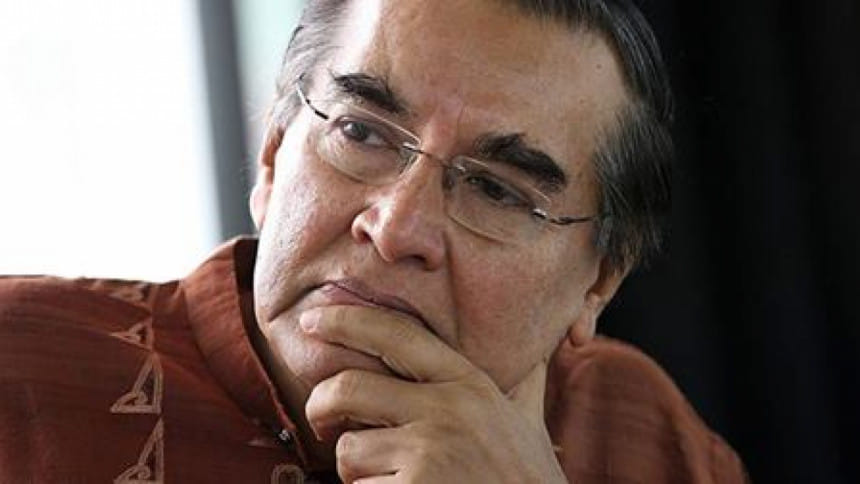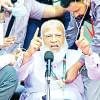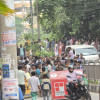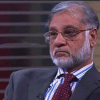Another step towards justice

One of Bangladesh's many tragedies was the near reversal, within three and a half years of our birth as a country, of the gains of our Liberation War and the coming to power, later, of people who not only opposed the birth of Bangladesh but actively participated in the genocide and crimes against humanity that was the hallmark of the Pakistani forces and their Bengali collaborators.
The rot began with the assassination of Bangabandhu and the taking of power by the killers. The subsequent killings of the four national leaders in jail, the coming to power of General Zia, changes brought to the constitution, the most condemnable of which was the indemnification of actions of Bangabandhu's killers. Thus came a time when ours became the only constitution in the world that protected self-proclaimed killers.
Though the propaganda has it otherwise, Bangabandhu never pardoned any alleged war criminal facing specific charges like rape, murder and arson. But the martial law regime repealed the Collaborators Order 1972 in 1975, thereby blocking the trials of collaborators. The regime led by General Ziaur Rahman released over 11,000 people who had been put behind bars on charges of war crimes.
In his effort to create a political base for himself, Zia, though himself a freedom fighter, brought into politics known razakars and all the Jamaat war criminals who went into hiding after independence and thus opened up the path for Jamaat-e-Islami's revival, the party that fought tooth and nail against our freedom struggle and participated, alongside the Pakistani army, in the genocide of our people. He also allowed Ghulam Azam into the country in 1978 on the pretext that the Jamaat leader wanted to see his mother.
Because of capture of power by the very forces that opposed the birth of Bangladesh, the issue of genocide and crimes against humanity were never raised at the international level and no one was ever held accountable for these crimes. As one martial law regime was followed by another and as army engineered and handcrafted political parties became a part of the regular feature of politics, our liberation war history was deliberately allowed to fade from public memory and more pernicious narrative was inserted that included forbidding naming Pakistan army as the one that killed and raped the innocent and freedom-loving people of what was then called East Pakistan and was substituted by a meaningless term, "Hanadar Bahini" (Marauding forces).
So, suddenly our freedom struggle was fought against an undefined and "unnamed" marauding force whose activities were perfunctorily described as some sort of attack on the people and our whole liberation war gradually became "a period of disturbance". For nearly two decades school children were taught that "Hanadar Bahini" fought against our freedom fighters, that Bangabandhu all but "surrendered" to Pakistan army and that Ziaur Rahman had "declared independence" and basically spearheaded the struggle.
It was against this background that the first significant voice demanding the trial of war criminals was raised by Jahanara Imam, whose son Shafi Imam Rumi, himself a freedom fighter, was arrested and tortured to death. She took the initiative to form "Ekattorer Ghatak Dalal Nirmul Committee" (popularly called Nirmul Committee) and led the movement to hold the trial of war criminals when Ghulam Azam, a notorious war criminal, was appointed ameer of Jamaat. She also took the initiative in March 1992 to constitute and convene Gono Adalat or People's Court and to hold the first ever public "trial" of the war criminals. Though this trial had no basis in law, as an expression of public wish it caught the imagination of the people in general and a ground swell of public opinion started to form in favour of holding war crimes trial. After the murder of Bangabandhu, and following the state-supported activities to distort and blur the memories of our independence struggle, Jahanara Imam's Gono Adalat was the most significant initiative that can be said to have culminated in the present trial. The BNP government took a hard line against this initiative and filed sedition charges against 28 of its organisers, including Jahanara Imam. She later died of cancer in 1994 at the age of 65. This case was withdrawn by the caretaker government headed by Justice Habibur Rahman. The Nirmul Committee was deftly steered by her successors, especially Shahriar Kabir who, to his great credit, kept the issue of the trial of war criminals alive even when political focus appeared to have shifted away from it.
The Awami League, which supported the movement of Jahanara Imam but later got deeply involved, from 1994 onwards, in the campaign to establish the caretaker government system to oversee election, gradually shifted its attention away from the Gono Adalat. Also, its desire to form a broad coalition against the ruling BNP, thus bringing Jamaat into a broader coalition in support of the caretaker government movement, made its anti-Jamaat stance rather muted.
After the nineties, the issue came to the fore again when the AL included in its 2008 election manifesto the pledge that it would hold the war crimes trial if elected to office.
Belying skepticism that the AL will not hold the war crimes trial and that it was only an election ploy, Sheikh Hasina took personal leadership in setting the process afoot. With some initial hiccups in formulation and launching of the trial, the international war crimes tribunal acquired experience and gathered momentum delivering for the first time some judicial redress to what has been a long cherished goal of the people of Bangladesh to bring those responsible for the genocide in 1971 to justice.
Today, it can be said without any doubt, and we have done so before, that without the firm determination and personal commitment of Prime Minister Sheikh Hasina the war crimes trial would not have taken place. Her clear vision, singular focus and exemplary courage made the trial possible which, after 40 years, in 2010 when it all started, seemed like a dream.
Like most trials of events from the remote past, ours also has critiques. Whatever flaws were pointed out went through corrective measures with the final process going through all the legal steps foreseen in our constitution.
For the people in general and especially for the freedom fighters, the war crimes trial, which was never an act of vengeance or retribution, must act as a catalyst for the revival of the fundamental values of our freedom struggle. The "war crimes trial" for all of us should not only be to "right the wrongs committed 44 years ago" but also to establish the goals that we had set for ourselves in 1971. Democracy, social and economic equality, secularism and fundamental freedom of thought and speech must return to the centre stage of our consciousness and political and social discourse and action. The corrosive effect of a society moving headlong towards inequality, discrimination and corruption must be resisted just as we resisted the "razakars and al-badrs" in 1971.
Thus the implementation of the verdict in each case, as it was early morning yesterday, is a step towards our long sought-after justice, a step towards establishment of a society under law, accountability and democracy.

 For all latest news, follow The Daily Star's Google News channel.
For all latest news, follow The Daily Star's Google News channel. 








Comments